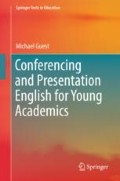Abstract
At many academic conferences, the number of non-native English-speaking participants is greater than that of native English speakers. But is the distinction an accurate or helpful one? In this chapter, we will first look briefly at the NES-NNES distinction and discuss its relevance in terms of performing CPs. Related to this NES-NNES debate, one of the more interesting and influential trends in applied linguistics over the past several years has been the gradual emergence and acceptance of English as a lingua franca (ELF), wherein NNES non-standard English forms are viewed and used as a distinct and legitimate variety of English. Academic conferences, given their international scope, serve as an almost perfect paradigm of the phenomenon. Therefore, we will discuss some of the features of ELF, the social/psychological effects it can have upon conference participants, and its impact upon conference speech events such as CPs.
Access this chapter
Tax calculation will be finalised at checkout
Purchases are for personal use only
References
Bambgose, A. (1998). Torn between the norms: Innovations in world Englishes. World Englishes, 17(1), 1–14.
Bloomfield, L. (1933). Language. New York: Holt Rinehart Winston.
Canagarajah, A. S. (1999). Resisting English imperialism in English teaching. Oxford: Oxford University Press.
Cogo, A., & Dewey, M. (2006). Efficiency in ELF Communication: From pragmatic motives to lexico-grammatical innovation. Nordic Journal of English Studies, 5(2), 59–94.
Davies, A. (2003). The native speaker: Myths and realities. Clevedon: Multilingual Matters.
Fairclough, N. (2006). Language and globalisation. London and New York: Routledge.
Firth, A. (2006). The discursive accomplishment of normality. On “lingua franca” English and conversation analysis. Journal of Pragmatics 26, 237–259. Oxford: Oxford University Press.
Jenkins, J. (2007). English as a lingua franca: Attitude and identity. Oxford: Oxford University Press.
Jenkins, J. (2009). English as a lingua franca: Interpretations and attitudes. World Englishes, 28(2), 200–207.
Kachru, B. B. (1982). South Asian English. In R. Bailey & M. Gorlach (Eds.), English as a world language (pp. 353–383). Ann Arbor: University of Michigan Press.
Kachru, B. (1985). Standards, codification, and sociolinguistic realism: The English language in the outer circle. In R. Quirk & H. Widdowson (Eds.), English in the world: Teaching and learning the language and the literature. Cambridge: Cambridge University Press.
Kachru, B. B. (1986). The alchemy of English: The spread, functions and models of non-native English. Oxford: Pergamon Institute Press.
Kachru, B. B. (1992). World Englishes: Approaches, issues and resources. Language Teaching, 25, 1–14. Cambridge: Cambridge University Press.
Kirkpatrick, A. (2007). World Englishes. Cambridge: Cambridge University Press.
Kirkpatrick, A. (2009). English as an international language in Asia: Implications for language education. In A. Kirkpatrick & R. Sussex (Eds.), English as an international language in Asia: Implications for language education (pp. 29–44). Switzerland: Springer.
Kirkpatrick, A. (2010). Researching English as a lingua franca in Asia: The Asian corpus of English (ACE) project. Asian Englishes, 1, 4–18.
Kortmann, B. (2010). Variation across Englishes. In A. Kirkpatrick (Ed.), The routledge handbook of world Englishes, (pp. 400–424).
Kramsch, C. (1997). The privilege of the non-native speaker. Publications of the Modern Language Association of America, 112, 359–369.
Kusters, W. (2003). Linguistic complexity, the influence of social change on verbal inflection. Ph.D. Dissertation, University of Leiden. Utrecht: LOT.
Martin-Martin, P. & Burgess, S. (2004) The rhetorical management of academic criticism in research article abstracts. Text: An Interdisciplinary Journal of the Study of Discourse, 24(2), 171–196.
Mauranen, A. (1993). Cultural differences in academic rhetoric. A textlinguistic study. Frankfurt: Peter Lang.
Mauranen, A. (2012). Exploring ELF: Academic English shaped by non-native speakers. Cambridge: Cambridge University Press.
Mauranen, A., & Ranta, E. (2009). English as a lingua franca: Studies and findings. Cambridge: Cambridge University Press.
Mauranen, A., Pérez-Llantada, C., & Swales, J. M. (2010). Academic Englishes: A standardised knowledge? In A. Kirkpatrick (Ed.), The world Englishes handbook (pp. 634–652). London, New York: Routledge.
Medgyes, P. (1994). The non-native teacher. Houndsmills: Macmillan.
Mesthrie, R., & Bhatt, R. M. (2008). World Englishes. Cambridge: Cambridge University Press.
Norton, B. (1997). Language, identity, and the ownership of English. TESOL Quarterly, 31(3), 409–429. doi:https://doi.org/10.2307/3587831.
Paikeday, T. (1985). The native speaker is dead. Ontario: Paikeday Publishing.
Phillipson, R. (1992). ELT: The native speaker’s burden? ELT Journal, 46(1), 12–18, doi:https://doi.org/10.1093/elt/46.1.12.
Seidlhofer, B. (2001). Towards making “Euro-English” a reality. English Today, 68, 14–16.
Seidlhofer, B. (2004). Research perspectives on teaching English as a lingua franca. Annual Review of Applied Linguistics, 24, 209–239.
Seidlhofer, B. (2006). English as a lingua franca in the expanding circle: What it isn’t. In R. Rubdy & M. Saraceni (Eds.), English in the world. Global rules, global roles (pp. 40–50) London: Continuum.
Swales, J. M. (1990). Genre analysis. Cambridge: Cambridge University Press.
Swales, J. (2004). Research genres: Explorations and applications. Cambridge: Cambridge University Press.
Trudgill, P. (2011). Sociolinguistic typology: Social determinants of linguistic complexity. Oxford: Oxford University Press.
Wallwork, A. (2016). English for presentations at international conferences. Switzerland: Springer Publishing International.
White, L. & Genesee, F. (1996). How native is near-native? The issue of ultimate attainment in adult second language acquisition. Second Language Research, 12(3), 233–265.
Widdowson, H. (1994). The ownership of English. TESOL Quarterly, 28(2), 377–389. doi:0.2307/3587438.
Author information
Authors and Affiliations
Corresponding author
Rights and permissions
Copyright information
© 2018 Springer Nature Singapore Pte Ltd.
About this chapter
Cite this chapter
Guest, M. (2018). ‘Native’ Versus Non-native English Speakers (NES/NNES) and English as a Lingua Franca (ELF) at Academic Conferences. In: Conferencing and Presentation English for Young Academics. Springer Texts in Education. Springer, Singapore. https://doi.org/10.1007/978-981-13-2475-8_5
Download citation
DOI: https://doi.org/10.1007/978-981-13-2475-8_5
Published:
Publisher Name: Springer, Singapore
Print ISBN: 978-981-13-2474-1
Online ISBN: 978-981-13-2475-8
eBook Packages: EducationEducation (R0)

